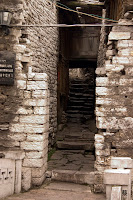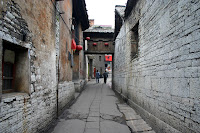
copyright TVB
Before I left for Vietnam, I finished A Change of Destiny. I'll try and keep this review relatively short as the truth is there is virtually nothing good to say about this disastrous 20-episode series. TVB's track record this year has been pretty dismal. And although I've yet to see all the series released, I have seen the majority of them and most of them have been frustratingly below par.
So back to this series. This is probably as bad as Devil's Disciples in its aimlessness. The script lacked focus and showed a lack of ideas, research and worst... effort.
It's a real pity as I felt that this series had some potential but far too much time was spent on setting up the relationships and the personalities of each of the major characters. While this is important, it really doesn't take more than half the series to set up the protagonists' personalities and history with each other. Seriously, I don't think I need to see 15 episodes of the two main male characters Yip Yeung (Benny Chan Ho Man who was horribly annoying and really over-acting in this series) and Yuen Hei (Steven Ma Jun Wai 馬浚偉) being idiotically juvenile for me to know that they are immature and that Yip Yeung is a bratty rich kid while Yuen Hei is a poor kid who wants more.
This series also suffers from a very common TVB series failing and that is the over emphasis on the romance in the series. Now if this was a romance or romantic comedy or a typical idol series, the concentration on the trials and tribulations suffered by the various couples would not only be fine but warranted. But A Change of Destiny isn't a romance and by placing so much emphasis on the silly romance and worse, the more juvenile aspects of romance, it only makes this series seem either devoid of ideas or lazily scripted.
The characters in this series are also terribly badly written and they change at will depending on where the writer feels he wants the story to go. With 20 episodes to play with, it is appalling that the writers/producers of this series didn't make better use of it to focus on character development so as to better illustrate the theme of this series. It just won't do to have characters like Yip Yeung and Yuen Hei flip-flop without any proper explanation as to how or why their characters change the way they do, or how their relationship with each other can change so drastically. They go from enemies to friends in the space of one scene. Just giving the viewers one scene to say that they are in a similar predicament and hence, begin to feel sympathy for each other after episodes on end of them hating each others guts just doesn't cut it. It is difficult for the viewer to figure out just how and why they would begin helping each other out.
Yip Yeung and Yuen Hei's characters are horribly contradictory and while I know the writer hopes to show that these are imperfect characters, his decision to place too much emphasis on their juvenile and immature antics and rivalry for a good part of the series gives them so much imperfection that it is difficult to reconcile the better parts of these men's characters with their worse halves. And in the end, they come across more ridiculous than imperfect.
It doesn't make it easier when the series introduces unrealistic and inconsistent characters like Princess Fei Fung (Mimi Lo) and her maid Sum Yi (Selena Li Sze Wan 李詩韻). While they do try and setup the fact that Princess Fei Fung is an atypical princess, she has so little princess in her character that she's more like just a girl from a rich family which lends little credibility to her character. Her maid Sum Yi doesn't fare much better. She is at times too streetwise to be a palace maid and at times so naive and pure that she seems like the typical cloistered maid of the imperial palace. Sum Yi, like the rest of this series, makes very little sense.
In the end, the only characters I feel favorably for are Fok Yi Na (Shirley Yeung Si Kei 楊思琦), Li Sing Tin (Yuen Wah 元華) and Yuen Zi Yan (Rebecca Chan Sau Chu 陳秀珠). Although, I usually find Yuen Wah more annoying than effective in most TVB series, his Li Sing Tin is a good person and his actions are relatively well explained and can be easily understood. The same goes for Fok Yi Na and Yuen Zi Yan's characters. But these characters aren't the focus in this series and they aren't even that memorable and hence, aren't able to add too much to this dismal series at all.
It is a real pity that the executive producer of this series didn't exercise better control of this series. It really did have the potential to explore the greater themes of fate, destiny and free will. It is also the perfect opportunity to introduce audiences to one of China's lesser known mystical books, the Tui Bei Tu (推背圖), loosely translated as "Back Pushing Diagrams". Click here and here for more info.
The series begins by detailing the historical backdrop for the series and introducing the audience to a lesser known Chinese book of divination and prophecy called the Tui Bei Tu. The reason why I call it a lesser known book is because the book that most people know is the I Ching. The easiest way to describe the Tui Bei Tu is to say that it is like a Chinese version of a book written by Nostradamus. It is a book about prophecy and it is as open to interpretation as the prophecies written by Nostradamus.
The basic question this series asks is if one can use these traditional Chinese methods of divination to try and predict the future and to change one's fate. Several characters are obsessed with trying to change their fate by either predicting the future using the existing signs or trying to manipulate things and people so as to swing things in their favour.
So the series begins the story in the Tang Dynasty and first introduces to audiences the joint creators of the Tui Bei Tu, Li Chun Feng 李淳風 and Yuen Tian Gang 袁天罡. The series then briefly talks about how these two men became bitter rivals and how the Tui Bei Tu was then divided between the men and passed on to their descendants. The Li family held on to the diagrams while the Yuen family held on to the inscriptions for each of the 60 diagrams. Without the pairing of the two parts, it would be impossible to decipher the prophecies. With that, the Li family and the Yuen family parted ways and they also agreed that their two families will have nothing to do with each other in the future. Now as we all know, in any story, this wouldn't do and so naturally, their descendents do meet and everyone from Song Emperor Zhao Guang Yin to Yip Yeung would like a piece of it.
Now in the series, Li Shing Tin holds the diagrams and Yuen Zi Yan holds the inscriptions and the key to unlocking the secret of the Tui Bui Tu. While looking for his long-lost wife and daughter, Li Shing Tin will take on Yuen Hei as his disciple and he will also meet Yip Yueng. What is interesting about Yuen Hei and Yip Yeung is that the two young men are born on the exact same day and at the exact same time. Yuen Hei is thus puzzled and dissatisfied that he should be an orphan and poor while Yip Yeung is a rich and spoilt young man. The question that Yuen Hei wants the answer to is if Yip Yeung and him have the exact same horoscopes, then how is it that he doesn't live a better life. Yuen Hei wants Li Shing Tin to help him to change his destiny. Meanwhile, Yip Yeung will face several trials later in the series and he too will want to change his destiny.
So the stage is set for the opportunity to discuss more interesting issues like whether a man's life and future is beholden to powers beyond him or if a man's destiny lies in his own hands. The series makes a few feeble attempts to answer the various interesting questions they bring up but all these attempts are quickly squashed under the weight of poor scripting, characterization and plot progression. And while the series does try and reach for a more powerful ending by suggesting that Yip Yueng and Yuen Hei's destinies lie in the decisions they make, still it is too little too late as these more important plot points come far too late in the series and they are surrounded by too much inconsistency in the plot and the characters for the series to make any significant statements about the questions it asks.
What a pity, what a waste. In short, do not rent this series. It's certainly not worth the money nor perhaps the amount of time I took to write this longer than expected review. =)

















